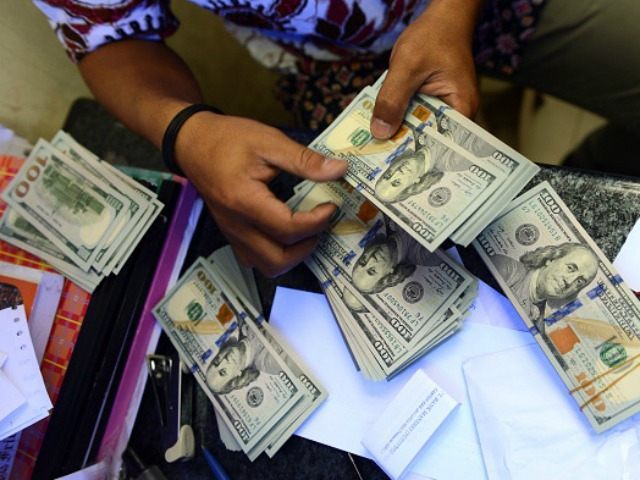The United States is the largest source of remittances — or funds sent overseas by foreign-born residents — in the world, according to the Government Accountability Office.
A new GAO report, requested by Sen. David Vitter (R-LA) and House Budget Chairman Tom Price M.D. (R-GA), reveals that foreign-born residents in the U.S. sent $54.2 billion in remittances abroad in 2014. Mexico, China, India, and the Philippines received the most money.
According to GAO’s analysis of the World Bank’s Bilateral Remittance Matrix, in 2014, about $25 billion was sent to Mexico, some $15 billion was sent to China, over $10 billion sent to India, and about $10 billion went to the Philippines. Other top receiving countries included Vietnam, Nigeria, Guatemala, El Salvador, Dominican Republic and Korea.
In 2013 Vitter introduced legislation — “The Remittance Status Verification Act” or the “Wire Act” that would impose a fee on remittances made by customers who wire money abroad but are unable to prove their legal status. The revenue from that fine would be directed to border security.
“The Obama administration has shown complete incompetence when it comes to securing our borders and a complete disinterest in enforcing our immigration laws – and it’s costing us a lot of money,” Vitter, who has reintroduced the “Wire Act” this Congress, said Tuesday in reaction to the GAO report.
According to a GAO footnote there are conflicting studies on whether illegal immigrants are more likely to send remittances depending on the country of origin.
“With regard to the likelihood of remittances, one study of Mexican migrants finds that unauthorized immigrants are more likely to remit, while another study of African migrants to Organization for Economic Co-operation and Development countries finds that unauthorized migrants are less likely to remit,” the report reads.
In addition to its analysis of remittances abroad, GAO reports that the methods the Bureau of Economic Analysis— which estimated that remittances from the U.S. in 2014 totaled $40 billion — used to gauge the level of remittances from the U.S. are unreliable and made recommendations to improve them. While BEA disagreed that their estimates were inaccurate they agreed to implement GAO recommendations.
In a separate GAO report, also requested by Vitter and Price and released the same day as GAO’s remittance estimate analysis, the watchdog found challenges in preventing remittance money laundering and other illicit uses in part due to the high reporting threshold of $3,000.
“Remittances can be used to launder proceeds from different types of criminal activities, including drug trafficking and human smuggling, through methods such as structuring,” wherein remittance senders would make multiple payments to stay below the $3,000 reporting level, the report reads.
As Vitter’s office argued, GAO’s reports offered insights into Vitter’s legislation, namely that the bill could raise up to $1 billion in revenue for border security and helping to keep money in the U.S. Additionally, it could help with immigration enforcement.
“DHS officials we spoke with said that, in general, collecting identification information would be beneficial to investigations but that verifying legal immigration status would not necessarily hurt or help their investigations,” GAO’s report on remittance money laundering reads. “They added that a lower funds transfer threshold was more crucial to their investigations. DHS officials did say that knowing senders’ legal immigration status could be beneficial if DHS was looking at potentially removing illegal immigrants from the country.”
Added Vitter, “This GAO report helps us determine how massive the remittances problem is with illegal immigrants sending billions out of the U.S. – money they likely haven’t paid income taxes on. Basically, we would be able to improve on our border security while making illegal immigrants pay for it.”

COMMENTS
Please let us know if you're having issues with commenting.